Items
-
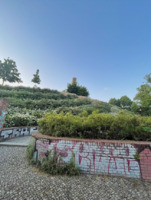 Modernity Today "This photo, taken in Berlin Germany, combines two aspects of modernity today. As depicted, this is a piece contrasting the natural and the industrial aspects of this city. This was a unique site to see, as this mound used to be a garbage field, but was turned into one of Berlins most notable parks." Taken by Lydianna Trudel. Submitted to the RESTORExchange Sustainability Photo Contest.
Modernity Today "This photo, taken in Berlin Germany, combines two aspects of modernity today. As depicted, this is a piece contrasting the natural and the industrial aspects of this city. This was a unique site to see, as this mound used to be a garbage field, but was turned into one of Berlins most notable parks." Taken by Lydianna Trudel. Submitted to the RESTORExchange Sustainability Photo Contest. -
 Al-Mizan: Covenant for the Earth "The Covenant presents an Islamic outlook on the environment in a bid to strengthen local, regional, and international actions to combat the triple planetary crises defined by the United Nations as climate change, biodiversity loss and pollution. It is a global endeavour to engage Muslims from all levels of society in the development and adoption of this call... Al-Mizan - A Covenant for the Earth is a restatement of the principles governing the protection of nature in a form that meets current challenges. It examines the ethics behind the social patterning of human existence and enquires into how they could be brought to life today working in harmony with the heartbeat of the natural world."
Al-Mizan: Covenant for the Earth "The Covenant presents an Islamic outlook on the environment in a bid to strengthen local, regional, and international actions to combat the triple planetary crises defined by the United Nations as climate change, biodiversity loss and pollution. It is a global endeavour to engage Muslims from all levels of society in the development and adoption of this call... Al-Mizan - A Covenant for the Earth is a restatement of the principles governing the protection of nature in a form that meets current challenges. It examines the ethics behind the social patterning of human existence and enquires into how they could be brought to life today working in harmony with the heartbeat of the natural world." -
 The Rewiring America Handbook: A Guide to Winning the Climate Fight "The COVID-19 pandemic showed the world the dire consequences of ignoring science and its predictions of global crises. But the pandemic was just a rehearsal for the climate disasters humanity will face – unless we act now. In his new book, Rewiring America, Saul Griffith, PhD argues that we can still address the threat of climate change, but only if we respond with a massive war-time mobilization effort to transform the fossil fuel economy into a fully electrified one, run on wind, solar, and other renewable energy sources. Based on the vast data about energy flows in the U.S. economy that his company, Otherlab, has mapped, Griffith details how to not only save us from climate disaster, but to help us enjoy a cleaner, healthier, and more prosperous future."
The Rewiring America Handbook: A Guide to Winning the Climate Fight "The COVID-19 pandemic showed the world the dire consequences of ignoring science and its predictions of global crises. But the pandemic was just a rehearsal for the climate disasters humanity will face – unless we act now. In his new book, Rewiring America, Saul Griffith, PhD argues that we can still address the threat of climate change, but only if we respond with a massive war-time mobilization effort to transform the fossil fuel economy into a fully electrified one, run on wind, solar, and other renewable energy sources. Based on the vast data about energy flows in the U.S. economy that his company, Otherlab, has mapped, Griffith details how to not only save us from climate disaster, but to help us enjoy a cleaner, healthier, and more prosperous future." -
 Mid-Winter Stroll on a Pier "A mid-winter stroll on a pier in beautiful Lake Erie. This lake is the most valued fishery in all of the Great Lakes. Keeping this lake clean is important for the human and non-human residents that depend on this water source. A resource that sustains all life." Taken by Gabriel Sanchez. Submitted to the RESTORExchange Sustainability Photo Contest.
Mid-Winter Stroll on a Pier "A mid-winter stroll on a pier in beautiful Lake Erie. This lake is the most valued fishery in all of the Great Lakes. Keeping this lake clean is important for the human and non-human residents that depend on this water source. A resource that sustains all life." Taken by Gabriel Sanchez. Submitted to the RESTORExchange Sustainability Photo Contest. -
 Locally Grown "Selling food grown locally at a farmers market." Taken by Aayushi Soni. Submitted to the RESTORExchange Sustainability Contest.
Locally Grown "Selling food grown locally at a farmers market." Taken by Aayushi Soni. Submitted to the RESTORExchange Sustainability Contest. -
 Bristlecone Pines Third Place Winner of the Sustainability Photo Contest. "Bristlecone pines live hundreds if not 1000 years. They live in one of the most unforgiving landscapes on Earth and yet survive." Taken by Harrison Frenken. Submitted to the RESTORExchange Sustainability Photo Contest.
Bristlecone Pines Third Place Winner of the Sustainability Photo Contest. "Bristlecone pines live hundreds if not 1000 years. They live in one of the most unforgiving landscapes on Earth and yet survive." Taken by Harrison Frenken. Submitted to the RESTORExchange Sustainability Photo Contest. -
 Self Portrait "This 35mm film photo is a self portrait taken on Rachel Carson Way in Ithaca, NY. To me, sustainability is taking small actions every day to better the people and the planet. This photo is representative of many sustainable actions I take in my day to day life, including shopping second hand, buying from small businesses, supporting local artists, supporting women in science, and traveling ethically." Taken by Lydia Derrico. Submitted to the RESTORExchange Sustainability Contest.
Self Portrait "This 35mm film photo is a self portrait taken on Rachel Carson Way in Ithaca, NY. To me, sustainability is taking small actions every day to better the people and the planet. This photo is representative of many sustainable actions I take in my day to day life, including shopping second hand, buying from small businesses, supporting local artists, supporting women in science, and traveling ethically." Taken by Lydia Derrico. Submitted to the RESTORExchange Sustainability Contest. -
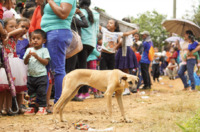 A Stray Dog in Honduras "A stray dog in Honduras. I took this photo during a medical brigade trip to Honduras. The dog is standing infront of a line of people waiting for medical attention. Our team was able to provide car to over 1,000 local individuals. The members of these less fortunate communities work hard to live a sustainable lifestyle without the items we take for granted on a daily basis. I care about this subject because the trip was eye opening experience for me." Taken by Nate Landever. Submitted to the Sustainability Photo Contest.
A Stray Dog in Honduras "A stray dog in Honduras. I took this photo during a medical brigade trip to Honduras. The dog is standing infront of a line of people waiting for medical attention. Our team was able to provide car to over 1,000 local individuals. The members of these less fortunate communities work hard to live a sustainable lifestyle without the items we take for granted on a daily basis. I care about this subject because the trip was eye opening experience for me." Taken by Nate Landever. Submitted to the Sustainability Photo Contest. -
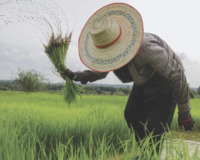 Roots for Change "'Roots for Change' is the culmination of a multi-year process in which CEE conducted research, hosted grassroots dialogues, and organized high-level consultations with communities across the globe. This initiative engaged diverse groups—including religious, spiritual and Indigenous communities—in conversations with UN partners, advocacy organizations and local government officials. By highlighting the ways cultural and spiritual traditions support and sustain ecosystem restoration projects, these consultations informed the 10 principles. ..."
Roots for Change "'Roots for Change' is the culmination of a multi-year process in which CEE conducted research, hosted grassroots dialogues, and organized high-level consultations with communities across the globe. This initiative engaged diverse groups—including religious, spiritual and Indigenous communities—in conversations with UN partners, advocacy organizations and local government officials. By highlighting the ways cultural and spiritual traditions support and sustain ecosystem restoration projects, these consultations informed the 10 principles. ..." -
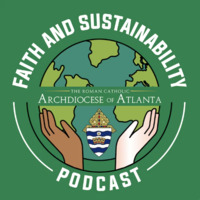 Faith and Sustainability Podcast The Faith and Sustainability podcast is a project created by the Archdiocese of Atlanta as part of their Laudato Si Initiative. Host Leonard Robinson is joined every week by influential members of different faith communities and environmental experts, where they discuss a wide range of topics like environmental justice, how to recycle, and climate change. The Faith and Sustainability podcast explores how faith and sustainability connect, and finding out how to better care for our planet.
Faith and Sustainability Podcast The Faith and Sustainability podcast is a project created by the Archdiocese of Atlanta as part of their Laudato Si Initiative. Host Leonard Robinson is joined every week by influential members of different faith communities and environmental experts, where they discuss a wide range of topics like environmental justice, how to recycle, and climate change. The Faith and Sustainability podcast explores how faith and sustainability connect, and finding out how to better care for our planet. -
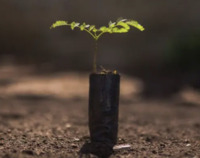 Plant With Purpose Plant With Purpose works to restore forests by planting trees in the most devastated and vulnerable parts of the world. They do this because they view the issues of global poverty and environmental damage as interconnected.
Plant With Purpose Plant With Purpose works to restore forests by planting trees in the most devastated and vulnerable parts of the world. They do this because they view the issues of global poverty and environmental damage as interconnected. -
 Rising: Dispatches from the New American Shore This resource contains a series of vignettes following Elizabeth Rush as she meets people all around American who have been affected in some way by global sea rising, as well as some of her own personal experiences. She gives voice to those otherwise not heard, and shares eye opening testimonials from those who experience the effects firsthand.
Rising: Dispatches from the New American Shore This resource contains a series of vignettes following Elizabeth Rush as she meets people all around American who have been affected in some way by global sea rising, as well as some of her own personal experiences. She gives voice to those otherwise not heard, and shares eye opening testimonials from those who experience the effects firsthand. -
 Threat of Global Warming/Climate Change - 2006 Statement of Conscience This resource contains the climate statement of the Unitarian Universalist Association. "Earth is our home. We are part of this world and its destiny is our own. Life on this planet will be gravely affected unless we embrace new practices, ethics, and values to guide our lives on a warming planet. As Unitarian Universalists, how can our faith inform our actions to remedy and mitigate global warming/climate change? We declare by this Statement of Conscience that we will not acquiesce to the ongoing degradation and destruction of life that human actions are leaving to our children and grandchildren. We as Unitarian Universalists are called to join with others to halt practices that fuel global warming/climate change, to instigate sustainable alternatives, and to mitigate the impending effects of global warming/climate change with just and ethical responses. As a people of faith, we commit to a renewed reverence for life and respect for the interdependent web of all existence."
Threat of Global Warming/Climate Change - 2006 Statement of Conscience This resource contains the climate statement of the Unitarian Universalist Association. "Earth is our home. We are part of this world and its destiny is our own. Life on this planet will be gravely affected unless we embrace new practices, ethics, and values to guide our lives on a warming planet. As Unitarian Universalists, how can our faith inform our actions to remedy and mitigate global warming/climate change? We declare by this Statement of Conscience that we will not acquiesce to the ongoing degradation and destruction of life that human actions are leaving to our children and grandchildren. We as Unitarian Universalists are called to join with others to halt practices that fuel global warming/climate change, to instigate sustainable alternatives, and to mitigate the impending effects of global warming/climate change with just and ethical responses. As a people of faith, we commit to a renewed reverence for life and respect for the interdependent web of all existence." -
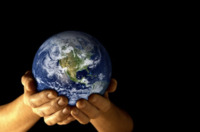 Turning Around Our Relationship with Earth is a Teshuvah Project The author recounts an unsettling encounter with a utility worker who downplayed the environmental harm of her gas leak. From here, she explains the true negative impacts of methane emissions on both people and the climate, and encourages us to act in a way that "turns around our relationship with Earth". She connects this with the Jewish tradition of Teshuvah, the time in between Rosh Hashanah and Yom Kuppur meant for repentance.
Turning Around Our Relationship with Earth is a Teshuvah Project The author recounts an unsettling encounter with a utility worker who downplayed the environmental harm of her gas leak. From here, she explains the true negative impacts of methane emissions on both people and the climate, and encourages us to act in a way that "turns around our relationship with Earth". She connects this with the Jewish tradition of Teshuvah, the time in between Rosh Hashanah and Yom Kuppur meant for repentance. -
 The Clan of One-Breasted Women In this excerpt, Terry Tempest Williams reflects on her family's long-running history of developing cancer that traces from nuclear testing in Nevada. Williams emphasizes her experience of coming to terms with deviating from Mormon norms if it means advocating for the U.S. government to take responsibility for liabilities regarding human health. Williams decides blind obediance will not get her anywhere, and she needs to start asking questions.
The Clan of One-Breasted Women In this excerpt, Terry Tempest Williams reflects on her family's long-running history of developing cancer that traces from nuclear testing in Nevada. Williams emphasizes her experience of coming to terms with deviating from Mormon norms if it means advocating for the U.S. government to take responsibility for liabilities regarding human health. Williams decides blind obediance will not get her anywhere, and she needs to start asking questions. -
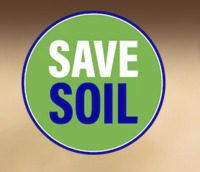 Save Soil This resource details a campaign to improve soil practices to be more sustainable through building up consciousness. The leader of this movement is Sadhguru, a spiritual leader. Sadhguru advocates for connecting inner spiritual processes to an affinity for nature. This is an international organization that started in Tamil Nadu, India.
Save Soil This resource details a campaign to improve soil practices to be more sustainable through building up consciousness. The leader of this movement is Sadhguru, a spiritual leader. Sadhguru advocates for connecting inner spiritual processes to an affinity for nature. This is an international organization that started in Tamil Nadu, India. -
 How Religion Intersects With Americans' View on the Environment Through this study, they intended to obtain information about how religious Americans view climate change. This article explains the results of a survey. It shows how some religious Americans express little concern about climate change, and carry the belief that “there are much bigger problems in the world, that God is in control of the climate.” Additionally, some say that “they do not believe the climate is actually changing.” This survey also sheds light on other concerns religious Americans carry, such as fear surrounding the consequences of environmental regulations (fewer jobs, increased energy prices, and loss of individual freedoms). Additionally, the survey extends to other religious affiliations as well as the religiously unaffiliated population.
How Religion Intersects With Americans' View on the Environment Through this study, they intended to obtain information about how religious Americans view climate change. This article explains the results of a survey. It shows how some religious Americans express little concern about climate change, and carry the belief that “there are much bigger problems in the world, that God is in control of the climate.” Additionally, some say that “they do not believe the climate is actually changing.” This survey also sheds light on other concerns religious Americans carry, such as fear surrounding the consequences of environmental regulations (fewer jobs, increased energy prices, and loss of individual freedoms). Additionally, the survey extends to other religious affiliations as well as the religiously unaffiliated population. -
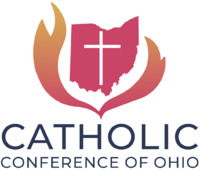 Care for Creation - Catholic Conference of Ohio "The Catholic Bishops of Ohio invite you to study the issues related to the stewardship of God’s creation. Care for the environment is a fundamental principle within Catholic Social Teaching. We applaud efforts already underway in many Catholic homes and institutions that help conserve energy, protect the environment, and advance a greater understanding of faithful stewardship. We hope that Catholic families and institutions around the state will continue in such efforts." This resource includes a statement calling to care for God's creation and contains information and links to several other resources related to religion and environmentalism.
Care for Creation - Catholic Conference of Ohio "The Catholic Bishops of Ohio invite you to study the issues related to the stewardship of God’s creation. Care for the environment is a fundamental principle within Catholic Social Teaching. We applaud efforts already underway in many Catholic homes and institutions that help conserve energy, protect the environment, and advance a greater understanding of faithful stewardship. We hope that Catholic families and institutions around the state will continue in such efforts." This resource includes a statement calling to care for God's creation and contains information and links to several other resources related to religion and environmentalism. -
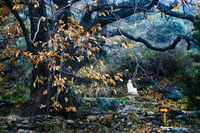 The World on Fire: A Buddhist Response to the Environmental Crisis The World on Fire: A Buddhist Response to the Environmental Crisis by Katie Javanaud explores how Buddhist teachings can inspire environmental activism. Javanaud examines key Buddhist sermons, such as the "Fire Sermon," which metaphorically portrays the world consumed by the flames of greed, hatred, and delusion, resonating deeply with contemporary environmental challenges. Greed is identified as a driving force behind the environmental crisis, fueling overconsumption and disregard for ecological balance. Javanaud illustrates how Buddhist principles offer insights to counteract societal norms of materialism and promote mindful living. The article addresses common objections to applying Buddhist teachings to environmentalism, providing valuable perspectives for those interested in integrating spirituality with environmental activism. This article serves as a concise introduction to Buddhist environmentalism, offering clarity on the compatibility of Buddhist values with ecological stewardship.
The World on Fire: A Buddhist Response to the Environmental Crisis The World on Fire: A Buddhist Response to the Environmental Crisis by Katie Javanaud explores how Buddhist teachings can inspire environmental activism. Javanaud examines key Buddhist sermons, such as the "Fire Sermon," which metaphorically portrays the world consumed by the flames of greed, hatred, and delusion, resonating deeply with contemporary environmental challenges. Greed is identified as a driving force behind the environmental crisis, fueling overconsumption and disregard for ecological balance. Javanaud illustrates how Buddhist principles offer insights to counteract societal norms of materialism and promote mindful living. The article addresses common objections to applying Buddhist teachings to environmentalism, providing valuable perspectives for those interested in integrating spirituality with environmental activism. This article serves as a concise introduction to Buddhist environmentalism, offering clarity on the compatibility of Buddhist values with ecological stewardship. -
 Taoist monks find new role as environmentalists This article details the efforts of Taoist leaders in China to incorporate sustainability in Taoist temples and promote a culture of environmentalism. Since 2006, the Daoist Ecological Protection Network has gained the support of 120 temples who have converted to the use of solar panels and biofuels. Taoist monks noticed many people to be ignorant towards their environmental impact, living a life of hyper-materialism. Monks wanted to help educate society about the actions that can be taken to ameliorate environmental issues both at the temples and in daily life. This pursuit is driven by a fundamental belief in Taoism to live in harmony with nature, a value that could have large impacts on society if adopted.
Taoist monks find new role as environmentalists This article details the efforts of Taoist leaders in China to incorporate sustainability in Taoist temples and promote a culture of environmentalism. Since 2006, the Daoist Ecological Protection Network has gained the support of 120 temples who have converted to the use of solar panels and biofuels. Taoist monks noticed many people to be ignorant towards their environmental impact, living a life of hyper-materialism. Monks wanted to help educate society about the actions that can be taken to ameliorate environmental issues both at the temples and in daily life. This pursuit is driven by a fundamental belief in Taoism to live in harmony with nature, a value that could have large impacts on society if adopted. -
 Why Conservative Christians Don’t Believe in Climate Change "American Christians have become increasingly polarized on issues of climate change and environmental regulation. In recent years, mainline Protestant denominations and the Roman Catholic Church have made explicit declarations of support for global climate action. Prominent Southern Baptists and other evangelical Protestants, on the other hand, have issued statements that are strikingly similar to the talking points of secular climate skeptics, and have attempted to stamp out 'green' efforts within their own ranks. An analysis of resolutions and campaigns by evangelicals over the past 40 years shows that anti-environmentalism within conservative Christianity stems from fears that 'stewardship' of God's creation is drifting toward neo-pagan nature worship, and from apocalyptic beliefs about 'end times' that make it pointless to worry about global warming. As the climate crisis deepens, the moral authority of Christian leaders and organizations may play a decisive role in swaying public policy toward (or away from) action to mitigate global warming."
Why Conservative Christians Don’t Believe in Climate Change "American Christians have become increasingly polarized on issues of climate change and environmental regulation. In recent years, mainline Protestant denominations and the Roman Catholic Church have made explicit declarations of support for global climate action. Prominent Southern Baptists and other evangelical Protestants, on the other hand, have issued statements that are strikingly similar to the talking points of secular climate skeptics, and have attempted to stamp out 'green' efforts within their own ranks. An analysis of resolutions and campaigns by evangelicals over the past 40 years shows that anti-environmentalism within conservative Christianity stems from fears that 'stewardship' of God's creation is drifting toward neo-pagan nature worship, and from apocalyptic beliefs about 'end times' that make it pointless to worry about global warming. As the climate crisis deepens, the moral authority of Christian leaders and organizations may play a decisive role in swaying public policy toward (or away from) action to mitigate global warming." -
 Golden Temple, Grey Air: Pollution in Amritsar This article describes how increasing tourist activity and reliance on the Bhgatanwala dumping site is creating air pollution that is threatening the integrity of the Golden Temple in India. While the Management Committee Golden Temple (SGPC) has taken action to reduce pollution from its kitchen and energy production, the government is failing to intervene and reduce pollution in surrounding areas.
Golden Temple, Grey Air: Pollution in Amritsar This article describes how increasing tourist activity and reliance on the Bhgatanwala dumping site is creating air pollution that is threatening the integrity of the Golden Temple in India. While the Management Committee Golden Temple (SGPC) has taken action to reduce pollution from its kitchen and energy production, the government is failing to intervene and reduce pollution in surrounding areas. -
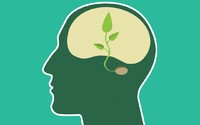 Towards a Psychology of Religion and the Environment This article discusses how religion is a powerful tool that can be utilized in promoting environmentalism. While religious text can be utilized both for and against environmentalism, religion more often than not helps to promote protection of the environment according to their findings.
Towards a Psychology of Religion and the Environment This article discusses how religion is a powerful tool that can be utilized in promoting environmentalism. While religious text can be utilized both for and against environmentalism, religion more often than not helps to promote protection of the environment according to their findings. -
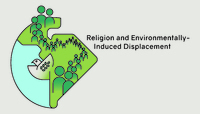 Religion and Environmentally-Induced Displacement The goal of this project is to enhance people's understanding of the religious response to environmental displacement in Latin America. This database includes a list of past workshops and public events related to the subject as well as relevant documentaries on the topic.
Religion and Environmentally-Induced Displacement The goal of this project is to enhance people's understanding of the religious response to environmental displacement in Latin America. This database includes a list of past workshops and public events related to the subject as well as relevant documentaries on the topic. -
 From the Ground Up: An Adult Outdoor Education Program
AKA Our Deen is Green! for Adults "We are happy to announce that applications are now being accepted for From the Ground Up: An Adult Outdoor Education Program (aka Our Deen is Green! for adults). This special program, funded by a grant from the National Park Service Chesapeake Gateways Office, will begin after Ramadan, in late April 2024, and continue into spring of 2025. It is a unique opportunity to become immersed in the various facets of ecology, environmental science, sustainability and stewardship. It will include monthly classes, mostly in-person and outdoors in parks and wildlife sanctuaries in DC, Maryland, and Northern Virginia, focused on specific aspects of and issues pertaining to our local region, the Chesapeake Bay Watershed. Classes will be led by local subject matter experts and include a variety of topics, including local plants and animals, the interconnectedness of our watershed, the challenges it’s facing, and what we can do to help. Specific classes will include: · An introduction to the Chesapeake Bay Watershed · Local herps: reptiles and amphibians · Monitoring stream health with benthic macroinvertebrates · Stream restoration and invasive plant removal · The importance of native plants and pollinator gardens · Watershed education through an interfaith lens · Native trees · Soil health · Environmental justice · Local birds and “bugs” · Solar power and clean energy · Sustainable living · Water-quality monitoring · And more! We are looking for 10-15 strongly committed local residents who are interested in learning about our local watershed, its needs, and what they can do to help it. Participants will be encouraged to create a long-term project or plan of action describing something they will do to support the watershed and/or encourage their families or communities to pay more attention to environmental issues. Program participants must be able to commit to the majority of the monthly classes. All in-person classes will take place on weekends and last 2 to 4 hours. (We will do our best to help provide transportation if necessary.) This entire program is being offered free of charge thanks to a National Park Service Chesapeake Gateways grant. The National Park Service Chesapeake Gateways Office (NPS Chesapeake Gateways) offers competitive grant opportunities to advance the Chesapeake Bay Initiative Act of 1998 within the full 41-million-acre Chesapeake Bay watershed. Chesapeake Gateways grants bring out familiar, untold, under-appreciated, or yet to be uncovered narratives and promote resilient communities & landscapes through tourism, sustainability, conservation & local economies throughout the Chesapeake Bay watershed. The program begins after Ramadan, with the introductory class set for April 21st! Applications are due by March 8th. Access the application form below. Please reach out to us at contact@greenmuslims.org with any questions."
From the Ground Up: An Adult Outdoor Education Program
AKA Our Deen is Green! for Adults "We are happy to announce that applications are now being accepted for From the Ground Up: An Adult Outdoor Education Program (aka Our Deen is Green! for adults). This special program, funded by a grant from the National Park Service Chesapeake Gateways Office, will begin after Ramadan, in late April 2024, and continue into spring of 2025. It is a unique opportunity to become immersed in the various facets of ecology, environmental science, sustainability and stewardship. It will include monthly classes, mostly in-person and outdoors in parks and wildlife sanctuaries in DC, Maryland, and Northern Virginia, focused on specific aspects of and issues pertaining to our local region, the Chesapeake Bay Watershed. Classes will be led by local subject matter experts and include a variety of topics, including local plants and animals, the interconnectedness of our watershed, the challenges it’s facing, and what we can do to help. Specific classes will include: · An introduction to the Chesapeake Bay Watershed · Local herps: reptiles and amphibians · Monitoring stream health with benthic macroinvertebrates · Stream restoration and invasive plant removal · The importance of native plants and pollinator gardens · Watershed education through an interfaith lens · Native trees · Soil health · Environmental justice · Local birds and “bugs” · Solar power and clean energy · Sustainable living · Water-quality monitoring · And more! We are looking for 10-15 strongly committed local residents who are interested in learning about our local watershed, its needs, and what they can do to help it. Participants will be encouraged to create a long-term project or plan of action describing something they will do to support the watershed and/or encourage their families or communities to pay more attention to environmental issues. Program participants must be able to commit to the majority of the monthly classes. All in-person classes will take place on weekends and last 2 to 4 hours. (We will do our best to help provide transportation if necessary.) This entire program is being offered free of charge thanks to a National Park Service Chesapeake Gateways grant. The National Park Service Chesapeake Gateways Office (NPS Chesapeake Gateways) offers competitive grant opportunities to advance the Chesapeake Bay Initiative Act of 1998 within the full 41-million-acre Chesapeake Bay watershed. Chesapeake Gateways grants bring out familiar, untold, under-appreciated, or yet to be uncovered narratives and promote resilient communities & landscapes through tourism, sustainability, conservation & local economies throughout the Chesapeake Bay watershed. The program begins after Ramadan, with the introductory class set for April 21st! Applications are due by March 8th. Access the application form below. Please reach out to us at contact@greenmuslims.org with any questions."
